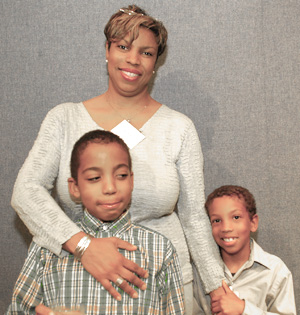Gina Womack
“Sue the state—how crazy is that!” Even after 15 years as an administrator at nonprofits, Gina Womack remembers being completely unprepared for what she found when she took a job at the Juvenile Justice Project of Louisiana. JJPL was filing suit on behalf of more than 500 children incarcerated at the state’s so-called Training Institute in Tallulah and Womack spent her first few weeks on the job filing accounts of broken bones, fights, beatings and abuse. But it wasn’t until the police brought a child to the office that she fully realized what she was working on: “He was in shackles and an orange jumpsuit, just a little, bitty kid. And I broke down and cried.”
Fielding phone calls from distraught families who had committed their at-risk children to state institutions for treatment, care and job training only to find them ensnared in a brutal system in which parents had no choice or voice, Gina lobbied the project to allow her to start a support group. Families and Friends of Louisiana’s Incarcerated Children (FFLIC) was born in 2001, taking its place in Louisiana’s history with a Mock Jazz Funeral that wound through the streets of New Orleans, mourning the dead and dying dreams of Louisiana’s children. After the U.S. Justice Department joined JJPL’s suit and expanded the plaintiffs to include all children in “secure care” in Louisiana, Womack began spending half her time traveling to community meetings (scheduled by the state in response to the growing outcry), steadily adding to FFLIC’s membership rolls.
“Families and Friends turned out to be the missing piece of the Juvenile Justice Project,” Womack says. “When you put faces and names on this issue, folks see that these aren’t super-predators, or “throwaway kids” no one cares about. They’re children with families who love them, who were struggling and turned to the system as a last resort.”
In June 2003, Governor Mike Foster signed the Juvenile Justice Reform Act into law. Laying the groundwork for more sweeping changes, the act ordered the closure of Tallulah and emphasized community-based alternatives to imprisonment. A year later Governor Kathleen Blanco created a new Office of Youth Development to remove juveniles from the adult correctional system and to train staff in child development. Tallulah, emptied of its charges, closed its doors in June 2004 and Womack became the full-time co-director of FFLIC.
When Hurricane Katrina blew out the lights in New Orleans, water began to rise in the locked cells of the Orleans Parish Prison, where 100 children would be abandoned for four days—without food, drink or a caring adult. Womack, her three children, her mother and her sister’s family were fleeing to Houston, unaware that their home was already filling with five and a half feet of water. From Houston, Womack’s family settled in Lake Charles and she and FFLIC sprang into action, desperately trying to locate, rescue and reunite their people. Then Hurricane Rita hit Lake Charles.
Last December, Louisiana’s new Office of Youth Development released their first 5-year plan. FFLIC applauded the emphasis on developing a continuum of care, including community-based options, as well as the stated commitment to engage families in the rehabilitation of their children. But Womack and her team want the Swanson and Jetson Centers for Youth closed down. In their place, they want to see services that will help kids thrive in their own homes and neighborhoods. Many schools are still closed and the education system is broken. There’s plenty left to do.
 Photo by Joshua Cogan
Photo by Joshua Cogan